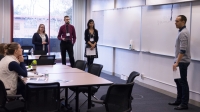Master's students in the POLS program are asked what would they do with $200 million in education funding.

Master's students present their proposal to alumni panelists during the POLS Challenge. (Photo: Marc Franklin)
What would you do if you had $200 million to spend on improving education?
That was the question put to students in the Policy, Organization and Leadership Studies master's program at Stanford Graduate School of Education last month for the first POLS Challenge - a role-play learning exercise that encouraged students to be creative and bold in coming up with ways to improve educational opportunities.
The event, which played out as a three-hour exercise during which teams of students pitched their big ideas to panels of accomplished GSE graduates, capitalized on the growing role of philanthropy in education and the important leadership challenge of channeling funds into promising educational efforts.
It also allowed current learners to engage with alumni who have real-world educational leadership experience. Graduates provided feedback on the proposals and ultimately decided whether to invest - up to a fictitious $200 million - in a team's effort.
"The literature is strong that challenge-based learning is highly instructive and gives you more flexible knowledge," said GSE Dean Daniel Schwartz at the Jan. 22 event. "Through discovery, you learn new ways of thinking and new processes. It stretches your thinking."
The POLS Challenge presented a situation that education nonprofit social entrepreneurs face today: A presentation aimed at persuading foundation executives, philanthropists, government policymakers and other funders to support a proposal. The idea was inspired in part by the Executive Challenge at Stanford Graduate School of Business. At the GSB, students' skills are tested in daylong business simulations, also judged by alumni.
David Brazer, POLS director, said incorporating a similar scenario at the GSE made sense: "Leadership in education in the 21st century will certainly involve various kinds of interaction with individuals, corporations and governments that control large sums of money," he said. "We're giving our students a chance to experiment and learn in a low-risk environment."
While it was low-risk, and the money was only pretend, students and alumni took it quite seriously.
Panelists pointed out the good: Strong handshake, good eye contact, clear presentation of facts, willingness to take on difficult and complex issues.
They also pointed out where work was needed: More data, more anecdotes, more tangible outcomes, better understanding of return on investment.
"I really appreciated the time and energy and authenticity everyone brought to the challenge," said Jennafer Carson, MA'09, who works with students as an aspirations advocate at Menlo Atherton High School.
Added Shannon Birk Jibaja, MA'13, "It was really neat as a judge to see the process and to lead a group through this process. This didn't exist when I was here. I'm jealous."
Mental health to housing
POLS is a 9-month master's program focused on preparing students to be innovative, socially responsible, action-oriented leaders in educational organizations.
Teams were organized by Brazer into students with complementary expertise and perspectives. Their specific task was to devise a plan to improve educational performance for a defined pre-k-16 student population in Santa Clara County _ an area that stretches through Silicon Valley from Stanford to San Jose.
The students were provided with a set of facts, including the poverty rate for the county, dropout rate and percentage of students on free or reduced meal plans. They were told plans should be ambitious but in compliance with existing education policy and regulations.
Rules for the challenge included a prohibition on hiring consultants or using technology in presentations.
The project needed to be proposed as a 10-year plan, self-sustaining by 2026.
Teams came up with projects to address mental health issues, college completion and the cost of housing in the area. Students also looked at creating a new innovative community college, developing programs to support English Language Learners and running a mobile community center.
"It was a very cool opportunity to start to understand and build your own theory about what creates change," said POLS student Alyssa Corrigan.
"We were able to take risks in a low-stakes environment," added Anica Bilisoly. "We thought let's just do it all because why not."
Most groups received at least some "seed" funding as alumni judges encouraged pilot programs that would test the more ambitious projects. One group did reap the full $200 million investment. Their plan supported schools in raising student achievement as the district prepares to receive additional capital under California's new funding formula.
"The challenge gave me and my group mates the opportunity to put into action what we have learned about education theory, policy, and practice from the GSE and nonprofit strategy from the GSB," said Derrick Johnson, one of the POLS student on that team. "This project was perhaps the most rewarding work I've done during the POLS program thus far."